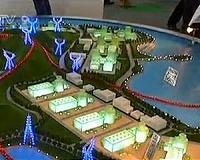 |
Niamey (AFP) March 29, 2010 French nuclear group Areva is not paying enough attention to the health of workers and inhabitants around its two uranium mines in Niger, Greenpeace said on Monday. The environmental lobby group called in a report for an independent radiation study to be conducted around the two mine sites at Arlit and Akokan in the country's northwest and for the area to be decontaminated. "The people of Arlit and Akokan continue to be surrounded by poisoned air, contaminated soil and polluted water," Greenpeace said. "With each day that passes, Nigeriens are exposed to radiation, illness and poverty -- while Areva makes billions from their natural resources," it said. Half of Areva's uranium comes from Niger, one of Africa's poorest countries despite being the world's third uranium producer, where the company has been mining since the late 1960s. Areva, the world-leader in nuclear energy and Niger's leading employer, has also signed a deal to start tapping a third mine in the desert nation from 2013 or 2014. "Greenpeace is calling for an independent study around the mines and towns of Arlit and Akokan, followed by a thorough clean up and decontamination (...) Areva must start to act like the responsible company that it claims to be," it said. Greenpeace carried out soil, water and air tests in Arlit and Akokan last November, which were studied in collaboration with the France-based Research and Independent Information on Radioactivity Commission (CRIIRAD) and Niger's Network of Organisations for Transparency and Budgetary Analysis (ROTAB). The research, which Greenpeace said was not exhaustive, showed abnormal concentrations of uranium in the soil, as well as of radon, a radioactive natural gas in air. "Radioactive scrap metal" from the mines was also available at local markets, according to the report. The tests were carried out around the mines as well as in mining villages, located several kilometres (miles) away and home to 80,000 people. "In four of the five water samples that Greenpeace collected in the Arlit region, the uranium concentration was above the World Health Organisation recommended limit for drinking water," the report stated. Often slammed by Greenpeace and other environmentalist groups, Areva said in January it would before the end of the year carry out a general inspection of its Niger sites to ensure the population was not exposed to radioactivity. "That move should resolve definitely the problem and ensure that members of the public are free from radioactive exposure," Areva spokeswoman Patricia Marie told AFP. Areva promised to shed light on the situation after Greenpeace's November visit identified "high levels of radiation on Akokan streets."
Share This Article With Planet Earth
Related Links Nuclear Power News - Nuclear Science, Nuclear Technology Powering The World in the 21st Century at Energy-Daily.com
 Nuclear Exhibition Opens In Beijing
Nuclear Exhibition Opens In BeijingBeijing, China (XNA) Mar 26, 2010 As the top industry event, the exhibition showcases the latest nuclear technology and products from around the world. China's own technology is the highlight of the exhibition. The Exhibition has four pavilions, covering nearly 10 thousand square meters. Over 200 nuclear enterprises from 15 countries and regions are participating in the event, including France, America and Russia. The boom ... read more |
|
| The content herein, unless otherwise known to be public domain, are Copyright 1995-2010 - SpaceDaily. AFP and UPI Wire Stories are copyright Agence France-Presse and United Press International. ESA Portal Reports are copyright European Space Agency. All NASA sourced material is public domain. Additional copyrights may apply in whole or part to other bona fide parties. Advertising does not imply endorsement,agreement or approval of any opinions, statements or information provided by SpaceDaily on any Web page published or hosted by SpaceDaily. Privacy Statement |